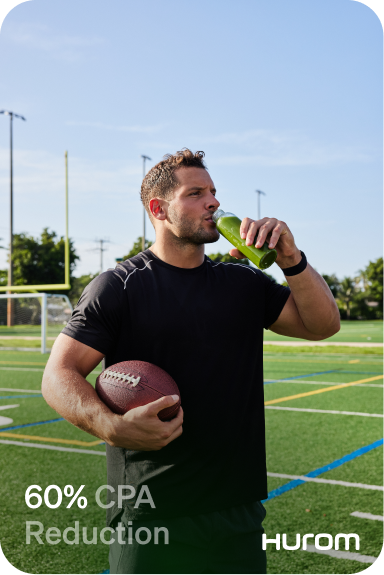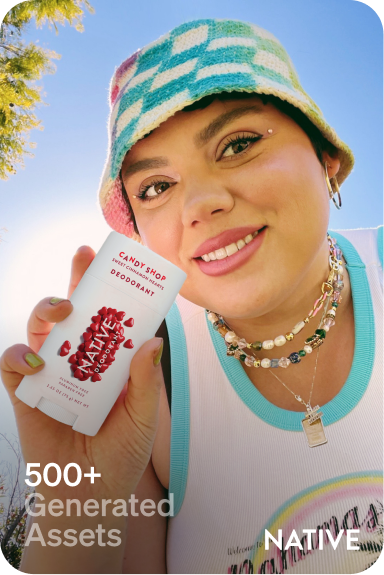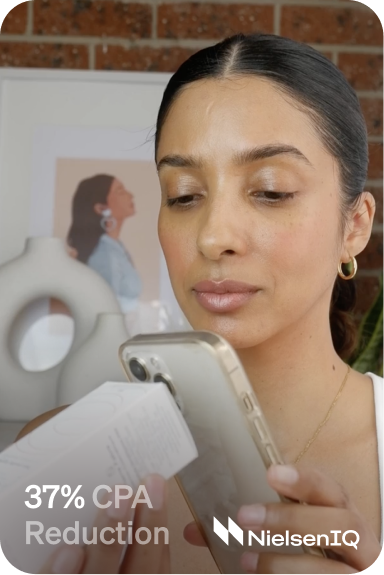According to HubSpot’s 2024 State of Sales Report, 18% of salespeople recognize the importance of social selling and consider it as one of their top five focus areas.
At the same time, it also suggests that this number is expected to rise significantly as social selling has been effective for various purposes, like increasing revenue, generating leads, or boosting brand awareness.
To give you a better idea of the overall performance of this approach, we have curated this guide that explains the importance of social selling with some data-backed figures. In this blog post, we will explore:
- What is social selling & its benefits
- General social media stats
- Social selling stats on different platforms
- Benefits of social selling backed by data
- Impact of social channels on decision-making and purchasing behavior
P.S.: Want to achieve exceptional results through social selling for your business? You can get in touch with inBeat. We promote brands via UGC, influencers, and TikTok marketing. Featuring creators from diverse backgrounds, we match your brand’s unique tone and resonate with your potential audience. Book a strategy call now to discuss your requirements!
What Is Social Selling
Social selling is a modern approach to sales that leverages social media networks to find, connect with, understand, and nurture potential buyers.
This strategy focuses on building authentic relationships with prospects and customers through social media channels rather than relying solely on traditional sales methods like cold calling and outbound marketing.
Benefits of Social Selling
Social selling offers numerous advantages that can transform your sales strategy and outcomes.
Some of the key benefits are:
- Increased sales opportunities: Social sellers create 45% more sales opportunities than non-social sellers. Actively engaging with potential buyers on social media allows sales professionals to identify and connect with prospects interested in their products. This generates a steady stream of qualified leads.
- Higher quota achievement: Sales reps who use social selling are 51% more likely to achieve their sales quotas. Social selling's targeted nature allows sales professionals to tailor their approach to the prospect's needs and preferences, leading to more successful sales conversations and higher conversion rates.
- Enhanced customer insights: Social selling tools enable sales teams to gather valuable insights about prospects and customers. Social media listening tools help monitor brand, industry, and competitor conversations, which allows for tailored sales pitches and solutions that align with customer needs
- Improved brand visibility: A strong social media presence enhances brand visibility and credibility. Sales professionals can position themselves as thought leaders and trusted advisors by sharing relevant content and engaging in industry conversations. This boosts the overall perception of the brand and attracts more potential buyers.
- Short sales cycle: Social selling shortens the sales cycle by allowing sales reps to quickly build rapport and address customer needs through social media. This streamlined process leads to faster deal closures.
- Cost-effective: Social selling is a cost-effective strategy compared to traditional methods like cold calling. Engaging with prospects on social media requires minimal investment but yields significant results in lead generation and conversions. This makes social selling an efficient and economical approach to sales.
- Increased revenue growth: 61% of organizations engaged in social selling report revenue growth. the targeted approach of social selling ensures that sales efforts are directed toward prospects who are more likely to convert, which in turn leads to higher sales and revenue.
General Social Media Platforms Stats
Social media has proven to be an effective channel for selling as it hosts a huge user base with many looking to purchase things through this medium.
Let’s have an overview of the prevalence of social media usage globally to understand why social selling is bringing successful results.
This section sheds light on how each platform ranks in different criteria when it comes to social selling:
- Global reach: As of April 2024, the global internet population reached 5.44 billion individuals. Among these, 5.07 billion, or 62.6% of the global population, actively used social media.
- Monthly active users: According to the latest data, the number of monthly active users on major social media platforms are:
- Facebook: Over 3 billion
- Twitter: 550 million
- Instagram: 2 billion
- LinkedIn: 930 million
- Pinterest: 498 million
- TikTok: 1.582 billion
- Reaching the US and Asian audience: If you want to target customers in the US and Asia, consider TikTok for social selling. As of April 2024, Indonesia has the largest TikTok audience, with 127.5 million users, followed by the US with 121.5 million users.
- Best in-platform shopping experience: According to HubSpot, 30% of consumers rank Instagram as #1 for having the best in-platform shopping experience. The figures for other social media channels include:
- Facebook: 29%
- TikTok: 15%
- YouTube: 10%
- Twitter: 6%
- Top platforms for B2B sales: According to HubSpot, Facebook is the most effective social media platform for salespeople, as 75% of them use it to find leads. This is then followed by Instagram, LinkedIn, and YouTube, with their numbers as provided below:
- Instagram: 51%
- LinkedIn: 43%
- YouTube: 41%
- X: 38%
- TikTok: 27%
- Top trusted platform for social commerce: In a 2022 Statista survey, YouTube emerged as the most trusted social network for product search and purchase among U.S. consumers. Approximately 60% of respondents expressed trust in the platform for social commerce.
Social Selling on Different Channels Stats
According to Mintel:
- Almost 50% of consumers have already made purchases through social media platforms.
- And 58% express a strong interest in doing so.
There are many social mediums through which you can sell your services or products.
Each has its importance, which will become clear after you go through the following stats.
1. Facebook
- Facebook commerce activity: Each month, approximately 1.228 billion individuals engage in purchasing activities on Facebook Marketplace. That’s almost 40% of its total number of users. Meanwhile, around 250 million people are selling their products here.
- Trusted social shopping platform: According to 38% of social media users, Facebook is the most trusted platform for social shopping. HubSpot’s 2024 State of Sales report identifies Facebook and LinkedIn as the top two most effective social media channels for B2B salespeople to discover new prospects.
2. Instagram
- Instagram shop: Instagram’s shopping feature has significantly boosted purchase intent by 1.2 times. In addition, 44% of users engage in shopping on the platform weekly.
- Powerful social selling tool: An impressive 92% of Instagram users take immediate action upon seeing a product. This showcases the platform's exceptional influence on social selling.
3. TikTok
- TikTok's influence in social selling: Approximately 55% of TikTok users have made purchases from brands after discovering their products on the app.
- Gen Z's preference for TikTok LIVEs: One-third of Gen Z users on TikTok are keen on purchasing products through TikTok LIVEs because they can see the products in action rather than just static photos.
4. LinkedIn
- B2B sales targeting: For B2B sales professionals aiming to reach top-level decision-makers, LinkedIn is an essential platform as it hosts over 65 million business leaders globally.
- Enhanced social traffic: Nearly 50% of social media-driven traffic to B2B websites is attributed to LinkedIn which makes it the top platform for B2B engagement.
- B2B lead generation: 89% of B2B marketers are leveraging LinkedIn to generate leads which highlights the platform's role in connecting with potential clients and driving business growth. Moreover, 62% of B2B marketers report that LinkedIn outperforms the next-best social platform by producing leads at double the rate.
5. Twitter
- Quickest sale ever: As per the Harvard Business Review report, a B2B sales representative recorded the fastest sale of his career through the effective use of Twitter for direct prospect engagement.
- Twitter Spaces: Twitter has introduced Twitter Spaces, a feature that enables live audio conversations. Twitter reports that a 10% increase in the use of Twitter Spaces has led to a 3% boost in overall sales volume.
- Twitter users as early adopters: More than half of Twitter users, specifically 53%, are likely to be the first to purchase new products, which adds to its effectiveness as a social selling platform.
6. YouTube
- Influence on purchases: A staggering 70% of YouTube users have made a purchase from a brand after seeing a product via video on YouTube.
- Increased conversion: More than 80% of marketers in both B2C and B2B sectors believe that YouTube videos effectively generate views, engagement, and sales.
Stats About Efficiency of Social Selling
Social selling has become a cornerstone for modern sales strategies, as it provides measurable improvements across various business areas.
Below are some key statistics highlighting the efficiency of social selling.
1. Generating Quality Leads
- Lead generation: 72% of marketers who have over five years of experience report that social media is an effective tool for lead generation. According to another research, social media is 100% more effective as a lead-generation tool compared to traditional methods.
- Lead quality insight: A significant 33% of sales professionals report that social media generates leads of the highest quality, comparable to those obtained through direct referrals from existing customers.
2. Targeting New Customers
- Targeting new prospects: Around 56% of sales representatives find new customers through different social media channels.
- Precision in targeting: More than half of social sellers identify precise audience targeting as one of the primary advantages of using social media for sales.
3. Enhanced Revenue
- Increased pipeline: Salespeople who actively share and interact on social media generate twice the sales pipeline compared to those who don't. This demonstrates the powerful role of social media activity in boosting sales opportunities and achieving higher performance.
- Revenue influence: Companies with robust social selling strategies are 31% more likely to achieve their revenue goals than those who stick to traditional ways.
- Boosting revenue: Clients of EveryoneSocial across various industries report a significant increase in deal sizes directly linked to their social selling efforts, with some experiencing growth of over 40%.
- Industry impact: Social selling influences half of the revenue in sectors like computer software, healthcare, and marketing.
4. Increased Sales
- Performance enhancement: 73% of sales reps who incorporate social selling outperform their peers who do not. They also exceed their sales targets more often by 23%.
- Effectiveness: 87% of sellers affirm that social selling has been effective for their business. Furthermore, 59% of them report their company is making more sales through social channels compared to previous years, which indicates the growth of social selling. For 90% of the highest achievers in sales, social selling tools have been a key factor in their success.
- Quota achievement: 64% of sales agents engaging in social selling meet their sales quotas, compared to only 49% of those who do not implement any social selling techniques.
- Impressive remote sales success: 31% of sales representatives who use social selling strategies have successfully closed deals exceeding $500,000, all without needing to meet the buyer in person. This shows the potential of social selling in facilitating significant business transactions through virtual interactions alone.
5. Other Benefits
- Deeper customer-brand connections: Around 31% of B2B professionals report that engaging in social selling has enabled them to forge stronger, more meaningful relationships with their clients.
- Social selling productivity: Social sellers who actively engage on social media platforms are significantly more productive as they can generate 38% more new opportunities compared to their counterparts using traditional sales methods.
- Time-saving approach: 39% of B2B professionals report that social selling significantly shortened their lead research time. Furthermore, they also reported that using social selling tools has significantly reduced the time they spend on researching accounts and contacts.
- Deal close: 64% of sales professionals successfully close deals using social media as a tool in their sales strategies.
Impact of Social Channels on Decision-Making and Purchasing Behavior
Social channels play a major role in shaping consumer decisions, as they provide platforms for product research, peer recommendations, and influencer endorsements, all of which significantly influence purchasing behavior.
Now, let’s discuss the impact of social media on these aspects:
- Social media as a research tool: 54% of social media users use these platforms to research products. Moreover, 71% are likely to buy products and services based on recommendations they encounter on social media.
- Higher engagement: 90% of consumers are likely to purchase from brands they follow on social media. If you do not have a social media account for your brand, start one, or you can buy an established Youtube channel, TikTok, Instagram or X account, to appear more credible and time tested.
- Executive social media usage: 84% of CEOs and VPs leverage social media for making purchasing decisions. This highlights the critical role these platforms play in influencing top-tier business leaders while indicating their importance in B2B social selling strategies.
Enhance Your Social Selling Tactics Like a Pro with inBeat
Social selling is becoming increasingly effective as it leverages the power of social media platforms to connect with potential customers. Sales professionals can build trust and better relationships that lead to higher conversion rates by engaging with prospects in a natural, non-intrusive way.
Key takeaways:
- Social selling is more economical than traditional sales methods as it requires less financial investment while delivering significant results.
- Active social sellers generate more sales opportunities and are more likely to meet their sales targets.
- Engaging with prospects on social media helps build trust quickly which leads to faster decision-making and shorter sales cycles.
- Salespeople can generate higher-quality leads that are more likely to convert by engaging on social media.
If you are looking to enhance your social selling tactics, inBeat can help! We are dedicated to scaling your brand on different social media platforms through a blend of paid media and micro-influencer marketing. Our campaigns are developed through data-driven insights to ensure they translate into higher performance and effective outcomes.





.svg)
.svg)
.svg)
.svg)


.svg)










